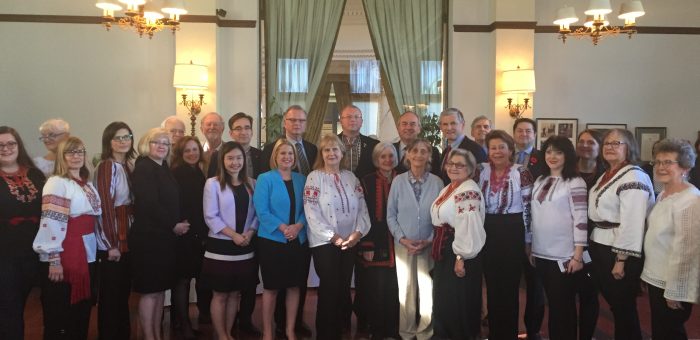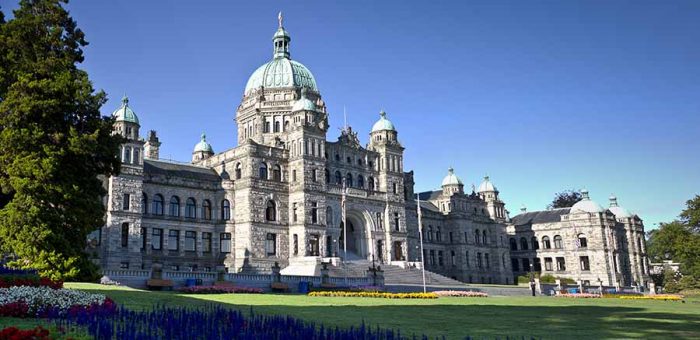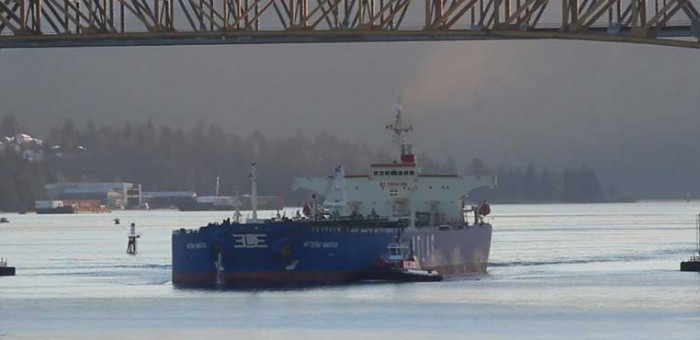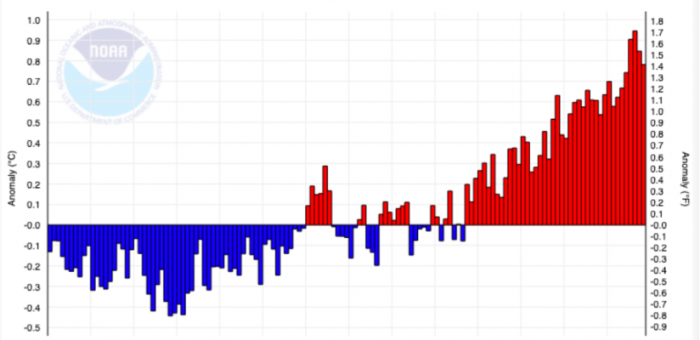Media Release
Bill passes unanimously to recognize the millions of Ukrainians killed in man-made famine
Today in the legislature my private member’s Bill M225: Ukrainian Famine and Genocide (Holodomor) Memorial Day Act, which I introduced on October 23rd and spoke to at second reading yesterday, passed unanimously in the house. It will receive Royal Assent on Thursday and subsequently be in effect immediately thereafter.
During committee stage I thanked the Members from the Official Opposition and Government for their support of the bill (brief remarks reproduced below in video and in text).
After its passage, a reception was held in the legislature. His Excellency Andriy Shevchenko, the Ukrainian Ambassador to Canada, was at the reception where he spoke to the importance of the bill.
I append below the press release my office issued in association with the bill’s passage.
Media Release
BC Green PMB passes unanimously to recognize the millions of Ukrainians killed in man-made famine
For immediate release
Oct. 29, 2019
VICTORIA, B.C. – A Private Member’s Bill from the B.C. Green Caucus passed unanimously today to honour those who died during the Holodomor – the Ukrainian Famine and Genocide of 1932-33. The legislation officially proclaims the fourth Saturday of November Ukrainian Famine and Genocide (Holodomor) Memorial Day.
The bill was introduced by B.C. Green Leader Andrew Weaver and is the result of collaboration with Bruce Ralston, Minister of Jobs, Trade and Technology, who introduced similar legislation in 2009.
“By enshrining Ukrainian Famine and Genocide (Holodomor) Memorial Day as an officially designated day in British Columbia, we are acknowledging and honouring the millions of people who were victims of this deliberate political strategy of starvation and we are asserting our collective pledge: never again,” said Dr. Andrew Weaver, MLA from Oak Bay- Gordon Head. “My grandfather and his family were survivors of the Holodomor. He and his wife, together with my mother and her siblings, made their way to Canada after the Second World War. She told me stories of living in a refugee camp in southern Europe and a chicken coop in France as they made their way to safety.
“Since then thousands more Ukrainians have made Canada their home, adding to the diversity of this great nation and contributing to its culture and prosperity. I am proud to be counted among the descendants who have made British Columbia their home.”
While the government of Canada has legislation recognizing this day, B.C. has never formally had its own legislation doing so. The gesture was more than symbolic for the Canadian Ukrainian community in B.C., and Ukrainian delegates witnessed second and third readings to show their support, including: Andriy Shevchenko, the Ambassador of Ukraine to Canada; Oleksandr Danyleiko, Consul General of Ukraine to Edmonton; Lubomyr Huculak, Honorary Consul of Ukraine at Vancouver; and Mr. Oleksii Liashenko, Counsellor with the Embassy.
This bill is the result of the shared values of this minority government and the B.C. Green Caucus’ collaboration with the Minister of Jobs, Trade and Technology. It will be implemented by the Ministry of Tourism, Arts and Culture.
“This legislation creating a memorial day for the victims and survivors of the Holodomor is the culmination of efforts spanning many years, starting with a private member’s bill I introduced back in 2009,” said Minister Ralston. “It is important that we take this time to reflect on this atrocity and pay homage to the survivors and their descendants living in B.C. who contribute so much to the strength and prosperity of this great province.”
“As we mourn the lives lost from one of the most heinous acts in history, we commit to stand together against hatred and violence in all its forms,” said Lisa Beare, Minister of Tourism, Arts and Culture.“The official declaration of Holodomor Memorial Day in B.C. speaks to the determination and leadership of our government to learn from this terrible event in Ukrainian history and our resolve to stand up against racism, hate and discrimination here in B.C. and around the world.”
These principles transcend party lines, as evidenced by the unanimous support it received.
“Holomodor, or death by hunger, was inflicted upon millions of Ukrainian citizens in the early 1930’s by draconian communist party policy. It carries with it a tragic legacy which is only considered a genocide by 16 countries in the world,” said Tom Shypitka, MLA for Kootenay East. “By formally commemorating Holodomor Memorial Day, we take a firm stance alongside the people of Ukraine and all their descendants by recognizing this dark period in world history and ensuring that through knowledge and acceptance of the past, we will never allow similar atrocities to happen.”
“Ukrainians and their descendants- indeed all of us- must never forget the atrocity of the Holodomor,” said MLA Weaver, “lest we forget. This legislation represents our commitment to remember our collective responsibility to challenge hatred and intolerance and to protect the vulnerable people in our society.
The mood was celebratory once the House stood after third reading.
“But today is also about life. It is about celebrating the beautiful, strong people who have added so much to British Columbia – to our economy, our food, our music. We are a great symphony of cultures here in this province. Today, we ensure that the light from the millions who died is never extinguished from our consciousness even as we celebrate their legacy.”
MLA Weaver, Minister Ralston, Minister Beare, MLA Shypitka, and the Ukrainian delegates gathered after the house recessed in the Ned DeBeck Lounge to listen to the Victoria-based LUNA Ukrainian Ensemble.
Background
- The Ukrainian Famine and Genocide killed between three and four million Ukrainians between 1932 and 1933 as part of Joseph Stalin’s plan to eliminate a democratic independence movement.
- The atrocities, including the total deaths, were covered up by Soviet authorities for decades.
- The survivors and their descendants have contributed to their communities across Canada and in BC.
- B.C. has annually proclaimed Holodomor Day the fourth Saturday in November under the Federal legislation. This legislation removes the need to annually proclaim this day by designating on the fourth Saturday in November Ukrainian Famine and Genocide (Holodomor) Memorial Day to exist in perpetuity.
-30-
Media contact
Macon L.C. McGinley, Press Secretary
B.C. Green Caucus
+1 250-882-6187 |macon.mcginley@leg.bc.ca
Text of Remarks
A. Weaver: I’m very excited that we’re moving to committee stage. I suspect, with a bill that’s rather short, it’s quite clear the questions will be minimal.
I do want to, once more, acknowledge members of the official opposition and members of government, including the ministers sitting beside me — the Minister of Jobs, Trade and Technology and the Minister of Tourism — for their support on this bill. I look forward to any questions that may come during this committee stage.
Sections 1 and 2 approved.
Preamble approved.
Title approved.
A. Weaver: I move the committee rise and report the bill complete without amendment.
Motion approved.
Video of Remarks
Announcing I will not seek re-election in 2021; asking party to prepare for a leadership contest
It is after a great deal of thought and reflection that I am announcing today that I will not be seeking another term as the MLA for Oak Bay-Gordon Head. I am making this announcement now so that the party has enough time to start the process of electing a new leader in preparation for the next provincial election.
When I first decided to leave my post as a Canada Research Chair in climate modelling and analysis at the University of Victoria to run for public office in 2013, I did so out of a sense of civic duty. I had watched with dismay as our province slipped from being a climate leader to climate laggard. The B.C. Green Party is where I felt I could make the most difference, but I could not imagine the many ways we would transform the B.C. political landscape.”
Below I reproduce the text and video of my speech along with the accompanying media release.
Video of Speech
Text of Speech
On April 23, 1910 at the Sorbonne in Paris, Theodore Roosevelt gave a speech on the responsibilities of being a good citizen. In it he urged people to have the courage to strive to make a difference.
In that address he said:
“It is not the critic who counts; not the man who points out how the strong man stumbles, or where the doer of deeds could have done them better. The credit belongs to the man who is actually in the arena, whose face is marred by dust and sweat and blood…”
I would echo that sentiment in my Climate and Society course at the University of Victoria when my students came to me distraught about global warming.
Vote for representatives who are willing to do the hard work to address climate change and support their policies, I’d tell them.
Or, if there are none on the ballot, consider running yourself.
Watching with dismay as our province slipped from being a climate leader to a climate laggard I eventually – and reluctantly – realized I needed to follow my own advice.
It’s long been my belief that those who seek public office should do so out of a sense of civic duty rather than choose it as a lifelong career.
In stepping aside from science and academia to enter the political arena, in 2013, I hoped to correct our emissions trajectory and prove that doing so would also benefit our economy.
The foundation of this minority government is climate action, best represented by our work on CleanBC – our economic plan to build a thriving, climate-responsible and climate-resilient society.
I have long said it is time we re-imagined the climate crisis not solely as an environmental problem, but as an incredible opportunity for innovation, creativity, and the advancement of our society.
While there is still a long way to go, CleanBC offers us the best starting place we’ve ever had, and I want to thank Minister Heyman and Premier Horgan for their earnest cooperation and collaboration on helping put that road map back in place.
I have taken significant time this summer to reflect with my family on the reasons why I sought elected office, as well as why I sought the leadership of the BC Greens in the first place.
It is with all of this in mind that I announce that I will not be seeking another term as MLA for Oak Bay-Gordon Head, and have asked the Chair of the Provincial Council to start the process of electing a new leader for the BC Greens.
This is not an easy decision for me – there is a long way to go.
At the same time I feel a deep responsibility and pride for the role the BC Greens have played in getting the province back on track to meet its climate commitments, and to reframe climate change as an economic opportunity – instead of a purely environmental issue.
Millions of people, including many thousands on the lawn of the legislature and a hundred thousand in Vancouver two Fridays ago, are demanding politicians stop talking and start acting to reduce greenhouse gas emissions.
This incredible movement is being led by youth, the ones who must live with the consequences of the decisions we make, and their momentum is growing.
This is also one of the main reasons why I believe it is time for the BC Greens to elect a new leader. It is time to let another generation take the lead.
I have given everything I have to this work. Soon it will be time for me to step aside and allow a new leader to take what I have accomplished and make it better.
Take it further.
And adapt it to the opportunities and challenges that the future will bring.
I intend to remain as leader of the BC Greens until a new leader is elected, which I expect will occur in the early Summer of next year, sometime after the next Spring legislative session.
In the months ahead I will continue to work on a number of key climate policies, including an ambitious climate accountability act, and doing everything I can to ensure that Clean BC is fully implemented.
I will continue to push the government to prioritize the policies that will allow us to reach our 2030 greenhouse gas reduction target.
I will continue to work with my colleagues in the BC NDP to accomplish what was set out in our Confidence and Supply Agreement.
Nothing that I am announcing today changes my commitment to work within this agreement and to see the delivery of our shared agenda.
Stability of this government moving forward is my primary objective.
For the party – and for anyone that may seek leadership of this party – this is an incredible opportunity. The BC Greens have never been as organized, nor seen such widespread support, as they do today.
Looking more broadly, we can all witness the rise of Green parties across the world and certainly here in Canada.
No point in history has ever had so many elected Greens in our country, and all signs point to even more being elected after the next Federal election.
The BC Greens have demonstrated that they are not only a positive influence on the legislature – but also an essential component of seeing real change in the policies that govern our province.
It was only after Greens were elected that MSP reform was committed to by all parties;
that BC banned corporate and union donations at all levels of government;
that our attention returned to what is in the best interest of all British Columbians, rather than the vested interests of just a few;
that an overhaul in the integrity and governance of this legislature commenced.
We have seen this minority government advance significant change on professional reliance, minimum wage, lobbying reform, the emerging economy and innovation.
We have seen this minority government advance significant change on protecting wild salmon, ridesharing, the environmental assessment process, adult basic education, child welfare, childcare, mental health and the opioid crisis to name just a few.
With environmental challenges mounting, the presence of Green representatives in the legislature has become all the more important.
For example, this past spring every BC Liberal and NDP MLA voted to introduce massive corporate subsidies for a new fossil fuel project in BC — not once — but fourteen times.
That I was unable to convince any of my colleagues in these two parties of the irrefutable contradiction to support this expansion while claiming to stand with the millions who are demanding greater climate action is, in my view, my greatest failing.
But it points once again to the essential role that the BC Greens play in this legislature: challenging the status quo parties to reconcile their words with appropriate actions.
Many of the details concerning the upcoming leadership race will have to wait until our party puts in place the rules for the contest.
I will work with whoever is elected as leader to ensure they have the voice they need to lead our party, including a conversation about representation in the legislature.
I look forward to continuing the work that we have in front of us for the time being and look forward to welcoming a new Leader at some point next year.
Media Release
Weaver announces he will not seek re-election in 2021; asks party to prepare for a leadership contest
For immediate release
Oct. 7, 2019
VICTORIA B.C. – Andrew Weaver, leader of the B.C. Green Party, today announced his decision not to run for re-election as MLA in the next scheduled provincial election in 2021. In preparation, Weaver has requested the party’s Provincial Council begin preparations for a leadership contest to select a new leader. Weaver will continue in his role as leader until a successor has been chosen by the party’s membership.
“It is after a great deal of thought and reflection that I am announcing today that I will not be seeking another term as MLA for Oak Bay-Gordon Head,” Weaver said. “I am making this announcement now so that the party has enough time to start the process of electing a new leader in preparation for the next provincial election.
“When I first decided to leave my post as Canada Research Chair in climate modelling and analysis at the University of Victoria to run for public office in 2013, I did so out of a sense of civic duty. I had watched with dismay as our province slipped from being a climate leader to climate laggard. The B.C. Green Party is where I felt I could make the most difference, but I could not imagine the many ways we would transform the B.C. political landscape.”
History was made when the B.C. Green Caucus agreed to support the province’s first minority government in 60 years through a confidence and supply agreement (CASA).
“We have shown that minority governments can work well. They unite parties on issues of common ground. The foundation of this minority government is climate action, best represented by our collaboration on CleanBC – our economic plan to build a thriving, climate-responsible and climate-resilient society,” Weaver continued. “I have long said it is time we reimagined the climate crisis not solely as an environmental problem, but as an incredible opportunity for innovation, creativity, and the advancement of our society.
“The decision not to run for re-election has not been easy for me. I feel a deep responsibility and pride for the role the B.C. Greens have played in getting the province back on track to meet its climate commitments and to reframe climate change as an economic opportunity – instead of a purely environmental catastrophe.”
B.C. Green Party Provincial Council will meet later this month to put a leadership contest committee in place. This committee will be responsible for recommending contest rules and timeline, eligibility and vetting for Provincial Council.
“Andrew propelled the B.C. Green Party into provincial relevance, and his decades of work as a climate scientist and then as an MLA greatly contributed to what we are seeing now with climate change being at the forefront of the national political conversation,” said Sat Harwood, chair of Provincial Council. “We will miss him as our leader, but his legacy is part of every British Columbian who values clean water and clean air. Andrew is excited for the future because he sees all this energy around tackling climate change; he is leaving the B.C. Green Party well positioned to offer British Columbians a unifying and fair, sustainable and equitable option when they go to the polling station in 2021.
“I expect the leadership contest will culminate at the party’s 2020 convention to be held in Nanaimo from June 26-28, but details regarding the leadership contest, including a launch date, will be released in the coming weeks and months as they are approved by Provincial Council.”
– 30 –
Media contact
+1 778-650-0597
newsroom@bcgreens.ca
Significant moments – Andrew Weaver
Andrew Weaver was elected as the first provincial Green politician in North American in May 2013 for the riding of Oak Bay-Gordon Head.
Weaver was acclaimed as the B.C. Green Party’s leader in December 2015.
During the Spring legislative session in 2016, Weaver introduced legislation that would require post-secondary institutions implement policies regarding sexualized violence. The B.C. Liberal government of the time agreed to support this initiative and introduced an updated version of the legislation that passed into law.
In September 2016, Weaver announced the party would no longer accept corporate and union donations, a major issue in the provincial election that followed.
The 2017 election resulted in the first provincial Green caucus in North America, which also holds the balance of power in the legislature.
Weaver led negotiations with the other parties, eventually reaching a confidence and supply agreement (CASA) with the B.C. NDP.
Notable CASA outcomes include: campaign finance reform, lobbying reform, Innovation Commission, Emerging Economy Task Force, CleanBC, Basic Income Study, Fair Wage Commission, new investments in childcare and early education.
CleanBC is the culmination of Weaver’s efforts to put B.C. back on track as a climate leader. It was announced by Weaver, Environment Minister George Heyman and Premier John Horgan in December 2018. Weaver and Heyman were awarded Canada’s 2020 Clean16 award in recognition of their collaboration in developing CleanBC.
In May 2019, Weaver and B.C. Greens introduced and unanimously passed the first opposition party private member’s bill in the history of the province. This legislation is also the first in Canada to provide a legal framework for businesses committed to pursuing social and environmental goals to incorporate as benefit companies.
The caucus’ second private member’s bill also passed in Spring 2019 also passed unanimously, the Residential Tenancy Amendment Act. Because making everyone feel safe in their home is a nonpartisan issue.
BC NDP government empowered to revisit Trans Mountain pipeline conditions
Today the BC Court of Appeal ruled unanimously that the BC NDP government must reconsider the conditions of the environmental assessment certificate allowing the expansion of the Trans Mountain pipeline. This is an incredibly important ruling as it means that the BC government now has the opportunity, which the BC Greens expect them to take, to reexamine the nebulous environmental conditions put in place by the former B.C. Liberal government. As I’ve argued numerous times in the past, politics clearly trumped evidence in the decision-making process of the NEB approval for the Transmountain pipeline. British Columbia now has the opportunity to ensure our coastal regions are protected.
As we move forward I am looking for the BC environmental assessment process to now properly consider the many issues I raised during the fundamentally flawed NEB process.
Below is a copy of the press release my office released following the BC Court of Appeal ruling.
Media Statement
B.C. NDP government empowered to revisit Trans Mountain pipeline conditions
For immediate release
Sept. 17, 2019
VICTORIA, B.C. – Today’s B.C. Court of Appeal’s unanimous ruling that the NDP government must reconsider the conditions of the environmental assessment certificate allowing the expansion of the Trans Mountain pipeline opens a path for additional environmental protections.
“The court has shown yet again the many shortcomings of the environmental assessment process that leaves our province facing the unacceptable environmental impacts that an expansion of the Trans Mountain pipeline threatens to bring to our province,” B.C. Green Party Leader Dr. Andrew Weaver said. “The B.C. NDP government has a responsibility to revisit the conditions placed by the former B.C. Liberal government.
“The negative long-term economic impacts related to increased emissions and the risk of oil spills associated with the Trans Mountain pipeline are indisputable. And British Columbians are already shouldering the environmental costs from climate change by way of our depleted oceans, stressed forests, shallow rivers, and dwindling resource economy.
“Tripling the capacity of the existing pipeline from Alberta’s oilpatch to Burnaby would pose an even greater threat to our future. A spill would be devastating to our environment, our coastal economies, and our tourism and fishery industries. Furthermore, the seven-fold increase in tanker traffic would pose significant threats to British Columbia’s already endangered Southern Resident Killer Whales. We ask again: Is the federal government ready to justify to Canadians why it is willing to herald the death knell of this iconic species?
“British Columbia’s economic future lies in the innovative, creative industries that are leading global economic growth, not in continued fossil-fuel infrastructure development that created the climate challenges that our communities and resource-based industries are struggling to cope with today.
-30-
Media contact
Macon L.C. McGinley | Press Secretary
B.C. Green Caucus
+1 250-882-6187 | macon.mcginley@leg.bc.ca
BC’s greenhouse gas emissions continue to climb in 2017
The BC NDP government released the 2017 greenhouse gas emissions data today. To no one’s surprise, BC’s 2017 GHG emissions increased by 1.2% from 2016 to 2017 to a total 64.5 million tonnes (Mt) of carbon dioxide-equivalent (CO2e), or roughly 13.1t CO2e per capita. Leading the way was a year-over-year 29% increase in emissions from natural gas flaring. Of course, this too is unsurprising as there is a glut of natural gas in the market and the predominant value from the drilling activity in the northeastern BC’s Montney Formation is in the liquids. A significant fraction of these liquids are shipped to Alberta where they are mixed with bitumen to form dilbit, the less viscous substance that can flow through pipelines. The gas, for which there is no market (and for which we have slashed royalty payments to the province and so literally give away), can be pumped back underground or burnt on site (flaring). And all of these activities are subsidized by the BC taxpayer to the tune of billions of dollars.
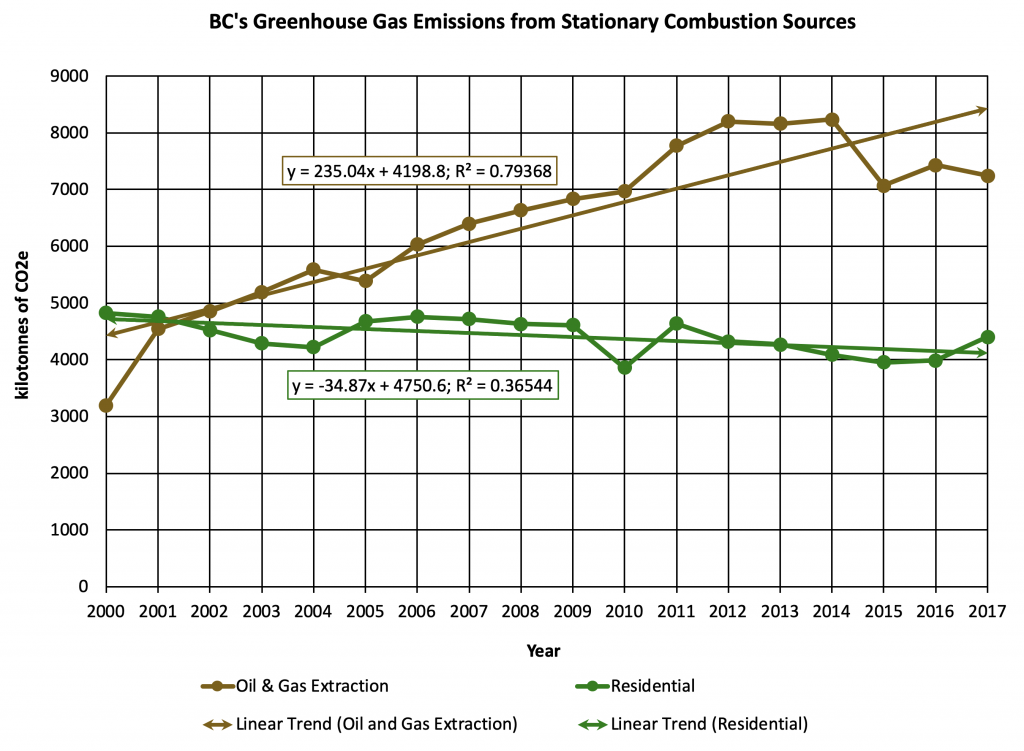
As I’ve outlined numerous times over the years on this blog site, with BC’s expansion into LNG, I do not believe the BC NDP government will be able to deliver a plan that will cut GHG emissions to 40% below 2007 levels by 2030. The premier claims that he will. I remain unconvinced.
Nevertheless, I remain very supportive of the CleanBC economic plan, which the BC Greens played an integral role in developing. However, I fear that it may be all for naught. As you will see in the above graph, the trend in emissions from the natural gas sector is on the rise, even without a single LNG facility in place. The trend in emissions from residential buildings is on the decline as we would hope.
Do we believe that it is fair for British Columbians to be burdened with the requirements and cost of reducing GHG emissions while we continue to offer subsidies and corporate welfare to the oil and gas sector? I think not for we have to work even harder as individuals to curb our emissions to account for the continued growth of emissions in the oil and gas sector.
Below I reproduce the media statement that I issued in response to government’s release of these new greenhouse gas emissions data.
Media Release
BC’s greenhouse gas emissions continue to climb
For immediate release
September 9, 2019
VICTORIA, B.C. – At a time when citizens are calling on their governments to ambitiously decarbonize – and every international panel has stated doing so is the only way to meet our agreed upon international climate targets- the provincial government’s recently released greenhouse gas data shows that BC, as of 2017, has failed to correct its emissions trajectory.
The data released today show total emissions in British Columbia increased 1.2 per cent from 2016 to 2017 to a total 64.5 million tonnes (Mt) of carbon dioxide-equivalent (CO2e), roughly 13.1t CO2e per capita. Emissions are now back up to 2007 levels when 64.8 Mt of CO2e was emitted, despite the BC NDP government last year committing to reduce emissions by 40% from this amount by the year 2030.
“We designed the CleanBC economic plan to start to tackle this challenge. Now that it is being implemented I expect we’ll start to see some slight emissions reductions, but it is clear we have a long way to go and we need to remain diligent in our commitment to our reduction targets,” said Dr. Andrew Weaver, leader of the B.C. Greens. “The timing of the release of these new emissions numbers is also particularly ironic as it comes on the heels of British Columbia announcing it’s sending a delegation to Japan to tout the potential export of highly subsidized LNG. As I’ve identified numerous times in the past, we cannot expand investment in the fossil fuel sector and hope to reduce our domestic emissions to promised levels.”
“British Columbians say they want to fight climate change. Looking at this data, they should be enraged that the lack of regulations in the oil and gas sectors means their footprint is two to three times larger than that of the average person living in the UK, Norway, New Zealand, Denmark and Sweden. The average British Columbia emits about 29 times the CO2e compared to an average citizen in Bangladesh.
“Our individual carbon footprint per British Columbian barely come in under our neighbours to the south, by a measly 12%. These numbers show us that we are not the concerned environmental stewards that we think we are, and it is because we have had governments that fail to regulate industry and fail to implement a vision for a new, green economy rooted in sustainable practices.”
This summer, government released its strategic climate risk assessment for British Columbia . Analyzing the climate risks likely to face British Columbia between 2040 and 2059, the report stated:
“British Columbia is already experiencing the effects of global climate change: average temperatures are increasing, sea levels are rising, and variable and extreme weather is becoming more frequent. Scientists expect these changes to accelerate and intensify in the years ahead, creating risks to society, natural resources, and ecosystems.”
British Columbia is contributing to global emissions rising when they need to be falling dramatically. The UN Intergovernmental Panel on Climate Change (IPCC) has repeatedly reported that carbon pollution needs to be cut by 45 percent by 2030 if we are to stay below 1.5C warming, beyond which even half a degree will significantly worsen climate change impacts and drag hundreds of millions of people into poverty.
“Now is not the time to protect the status quo or invest billions in expanding the oil and gas sector,” Weaver said. “Now is the time to rise to the challenge before us. Climate change is an immense risk if we don’t do anything about it. But it is also an incredible opportunity if we act. We can- and must- build cleaner and healthier communities and vibrant, resilient, sustainable economies.”
CleanBC was developed in collaboration with the BC NDP government and supports the commitment in the Confidence and Supply Agreement to implement climate action to meet B.C.’s emission targets.
Quick Facts
In 2016, the most recent global data available from the International Energy Agency, the United Kingdom’s per capita emissions were 5.65t CO2e, New Zealand’s were 6.45t CO2e, Norway’s were 6.78t CO2e, Denmark’s were 5.84t CO2e and Sweden’s were 3.83t CO2e. For comparison, per capita emissions in Bangladesh were 0.45t CO2e and in the United States were 14.95t CO2e.
This puts the average British Columbian’s carbon footprint 2.3, 2.0,1.9, 2.2 and 3.4 times larger than that of the average person living in the UK, Norway, New Zealand, Denmark and Sweden, respectively.
-30-
Media contact
Macon L.C. McGinley, Press Secretary
B.C. Green Caucus
+1 250-882-6187 |macon.mcginley@leg.bc.ca
BC Green caucus celebrates equitable access to menstrual products for students
Great Victoria School District officially launched its initiative today to provide free access to menstrual products for students. Ensuring equitable access to menstrual products is an important issue long advocated for by groups like the United Way Period Promise campaign, and I am proud to have played a part in helping move this initiative along.
As you will see from my Question Period exchange the Minister of Social Development and Poverty Reduction:
“We all expect when we enter a public washroom that toilet paper is readily available and free. Why that isn’t the case for menstrual products is a very good question. One, I suspect, that if men had a menstrual cycle, we wouldn’t be asking today.“
Below I reproduce our media statement celebrating the BC Government and Victoria School District’s announcement.
Media Statement
BC Green caucus celebrates equitable access to menstrual products for students
For immediate release
September 5, 2019
VICTORIA, B.C. – Today the BC Green caucus is celebrating the official launch of the Greater Victoria School District’s initiative to provide free access to menstrual products for its students.
“Ensuring equitable access to menstrual products is an important issue long advocated for by groups like the United Way Period Promise campaign, and I am proud to have played a part in helping move this initiative along,” said B.C. Green Party Leader MLA Andrew Weaver.
In March, Weaver asked Minister of Social Development and Poverty Reduction, as well as the Minister of Education, how the upcoming poverty reduction strategy will ensure that all children and youth have equal access to menstrual products. One month later, government announced it would require all public schools in the province to provide free menstrual products in school washrooms.
“In a minority government, a key part of our role is to bring new ideas to the table, advocate for great ideas already out there, and work with government to inspire them to act. In this case, we are thrilled at the outcome,” Weaver said. “No student should feel restricted in their ability to participate in lessons or sports because they lack access to a basic need.
“Protecting children from harm -whether it be stigma or abuse- and advancing gender equity have been two areas in which the B.C. Green Caucus and B.C. NDP clearly agree. Making schools and society safer and more equitable for all of our children is a nonpartisan pursuit that unites British Columbians.”
A B.C. Green Caucus bill amending the Residential Tenancy Act garnered tripartisan support this May and passed with full votes from the NDP and Liberals. The bill provides renters who are victims of violence associated with their home, or whose children are victims of violence, to break their fixed term lease and seek safety.
Also in May, B.C. Greens, alongside stakeholders and LGBTQ2+ rights advocates, tabled legislation that would ban the abusive practice of conversion therapy.
“We hope government continues to show support for the children of British Columbia this fall by working with our caucus to ban so-called conversion therapy,” Weaver said.
-30-
Media contact
Macon L.C. McGinley | Press Secretary
B.C. Green Caucus
+1 250-882-6187 |macon.mcginley@leg.bc.ca

